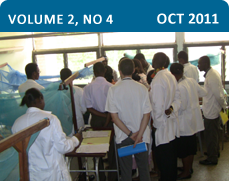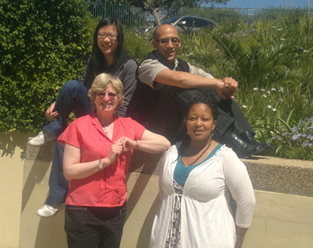| |

|
|
IN
THIS ISSUE |
 |
|
Latest OER |
 |
|
Share this newsletter with your colleagues |
 |
|
South Africa-UK virtual conference on teaching and learning in public health |
 |
|
OER buzz from the Health Sciences Faculty @ University of Cape Town |
 |
|
Distribution and tracking methods for the Network |
 |
| |
| |
LATEST NEWS |
 |
|

On 26 October 2011, OER Africa will be showcasing its OER projects at the University of Witwaterstand (WITS), in Johannesburg - South Africa as part of the Open Access Week.
From the 25 - 26 Kwame Nkrumah University of Science and Technology (KNUST), in partnership with Computer Aid International BioMed Central will be hosting Open Access Africa 2011 conference.
Open Access Week, is a global event promoting Open Access as a new norm in scholarship and research, is taking place 24-30 October 2011. Now in its 5th year, Open Access Week provides an opportunity for the academic and research community to learn about the potential benefits of open sharing and adopting it as a new norm in scholarship and research. |


 |
|
On 13 October 2011, OER Africa and University of Michigan facilitated the first Health OER Network Partners Forum, which brought together senior staff involved in health education initiatives around the world to discuss strategies for advancing health OER in Africa. Some of the themes that emerged from the discussion include funding and resourcing OER initiatives; identification of existing OER networks; frameworks for common curricula development and policy frameworks in support of OER. |

  |
 |
On 5 October 2011, in a blog post, education consultant Tony Bates acknowledged the resource richness of the African Health OER Network resource collection, commenting that the Network“ has a nice new web site, with nearly 300 resources for free downloading. About half of these resources are in the Public and Community Health areas.” |

  |
 |
In August 2011, evaluation expert and Emeritus Professor at the School of Education and Development, University of KwaZulu-Natal (UKZN) Ken Harley published a paper, “Insights from the Health OER Inter-institutional Project” in the August 2011 special issue of Distance Education, Volume 32, Issue 2. |

 |
|
| |
FEATURED HEALTH OER COLLECTION |
 |
| |

The Health Education and Training (HEAT) in Africa programme was launched in early 2011 by the Open University, UK. Working collaboratively with governments, UNICEF, AMREF and the World Health Organisation, as well as with funding institutions, and non-governmental organizations, HEAT aims to reach and train 250,000 health care workers in Sub Saharan Africa by 2016. To achieve this, HEAT has developed 13 health care learning modules in collaboration with the Ethiopian Federal Ministry of Health, Regional Health Bureaus, and health experts and science specialists in Ethiopia. These modules are currently being used to upgrade the theoretical knowledge of 33,000 rural Health Extension Workers, Health Extension Practitioners and new entrants to the health service. Click here to view the modules. |

  |
 |
| |
| |
| |
| |
| |
| |
| |
| |
| |
| |
| |
| |
| |
| |
| |
| |
| |
| |
| |
| |
| |
|
|
|
|
|
| |
|
Over 60 of the videos from the Kwame Nkrumah University of Science and Technology (KNUST)and University of Ghana learning modules are now available for viewing on YouTube and download from Internet Archive:
Seven textbooks from University of Cape Town and University of the Western Cape School of Public Health are now available in multiple file formats (online viewing, PDF, ePUB, Kindle, etc.) through Internet Archive and Slideshare. |
|
During recent interviews with OER creators from one of our partner institutions, we learned that some of the Network participants are not receiving this newsletter, and do not even know that it exists. This made us realise that the newsletter may not be reaching everyone who may find it useful. As such, for this issue, we would like to initiate a receive-one-send-one campaign, where each person receiving the newsletter is encouraged to send a copy to one colleague or friend who may be interested in the contents of the newsletter. This way, you’ll be sure to know that your colleagues are aware of the latest developments with the Health OER Network. Your colleague/friend can subscribe to the newsletter using the link in the header of this newsletter, or from the African Health OER Network website. Thanks for sending a copy!

Show your support by signing the declaration which indicates a commitment and support to open education and the African Health OER Network. |
|
On 14 July 2011, the School of Public Health at the University of the Western Cape and the Centre for Primary Health and Social Care at the London Metropolitan University held a video conference on teaching and learning in a Masters in Public Health programme. These universities collaborate as part of the British Council’s Development Partnership in Higher Education (DelPHE) initiative. Below is a summary of the conference in a guest article by Nandipha Matshanda from UWC.
The aim of the conference, titled “Pedagogies and technologies supporting our curricula”, was twofold: to enable the two institutions to share methodologies and strategies for teaching and learning in public health, and to test the methodology of virtual conferencing as a possible future student support tool for Masters in Public Health students. The conference revealed that video conferencing can be an effective tool for cross-country collaboration.
The conference presentations highlighted:
- By using a common learning management system, the London Metropolitan University and the City University of New York are collaborating on teaching classes “across the pond” on the same topic in the same semester, using the same lecturers and with students researching the same topics in their respective cities.
- The use of online discussion groups for teaching epidemiology at post-graduate level offers possibility for diverse methodologies for teaching at post-graduate level. Additionally, innovative integration of an electronic game can foster analysis of a case study while acquiring epidemiological skills and concepts.
- Case studies can effectively enhance teaching in a Public Health programme. The UWC School of Public Health has established a repository of case studies on Public Health topics for internal use as well as for sharing widely as Open Educational Resources.
The conference was valuable in that it enabled sharing of pedagogical approaches used in the two universities, highlighting possibilities for enhanced teaching and learning experiences. Also most valuable was discovering the possibilities of using video-conferencing as a student support mechanism in a master’s level course and, especially, one conducted across continents. |
|
In the August issue of the newsletter, Greg Doyle wrote a guest article advocating “Sharing topics of OER under development.” Several institutions continued the discussion of OER in progress at their institutions through the oer-tech discussion group October call. In this issue, Greg shares news of what is currently in development at the University of Cape Town (UCT) Health Sciences Faculty (HSF).
A fresh buzz is perceptible in the Faculty - people are talking about OER and thinking about their implications for practice. OER development is providing the opportunity to reflect on established teaching resources and to identify possible ways to improve them by using or adapting teaching resources from other institutions that are openly shared. One result is that more educators are looking at their own material to assess whether it is suitable for the public domain.
Until now, the UCT Health OER team, which supports academics in OER development, has been working on publishing existing course material to an online and accessible OER format, as well as assisting faculty to create new material as OER for teaching and learning. In the next few months, we are looking forward to releasing a neurological examination teaching video for third-year students, case studies in Digital Pathology, and a visual, interactive key which teaches students about human rights and health. All of these will be released under an open licence.
The Health OER team is also assisting with the development of OER from the Health Economics Unit and additional modules from the Postgraduate Diploma in Occupational and Environmental Health (Modules 4 to 8). Other resources in development include digital stories from Postgraduate Diploma of Clinical Education, a film on Lifestyle Diseases from the Department of Human Biology, and a video of the blood culture procedure for final year students from the Clinical Skills Centre.
Some of these resources will only be ready in 2012, but it is exciting to see the developments and growth in OER. These OER will help contribute to teaching and learning inside and outside the classroom context, as well as increase visibility, awareness and networking between individuals, departments and institutions.

Photo CC BY Greg Doyle - Some of the OER team, from top to
bottom,
left to right Sam Lee Pan, Greg Doyle, Veronica Mitchell
and
Matumo Ramafikeng
If you would like to share your OER development process with us or have any queries regarding what we are developing, please contact healthoer@uct.ac.za
|
|
One of the goals of sharing Open Educational Resources is to increase the visibility and use of educational materials. In order to meet that goal, OER must have low barriers to access, be findable through a variety of pathways, be available in common file format(s), and be traceable so that you know when, how, and how many people are accessing them. For this reason, the African Health OER Network pursues multiple distribution methods for widespread availability of OER across the continent and the world. The OER produced through the Network are distributed through multiple offline and online methods by the authoring institution, OER Africa, and University of Michigan. Kathleen Ludewig Omollo created a single-page chart to show all of the current distribution methods, as well as more detailed explanation (view the video or presentation slides).
|
|
|
|
|

